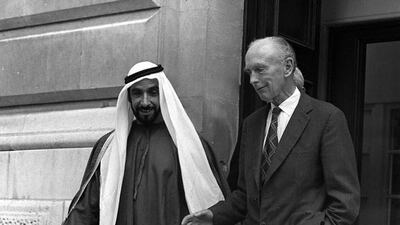It’s September 1973, only a few weeks before Opec’s oil embargo during the Arab-Israeli War which would shake up the western world, and Sheikh Zayed leaves the British Foreign Office in London with foreign secretary Alec Douglas-Home. The man waiting for them at No 10 Downing Street is prime minister Edward Heath, in a peculiar alignment of the political stars. And there is much to discuss.
Both Englishmen had been in Opposition when the Labour government announced its intention to withdraw British troops from the Arabian Gulf, blaming the country’s dire economic straits. How could such spending overseas be justified, the Labour prime minister Harold Wilson argued in 1968, when cuts to social welfare programmes at home were required?
The Conservative Party, the United States government and Gulf rulers were shocked by this bombshell, with Douglas-Home accusing Wilson of a dereliction of duty.
Soon after, Heath visited the southern Gulf States to urge support for the proposed UAE among its neighbours, and declared that Britain should keep a military foothold in the region.
But how quickly political promises are broken: it fell to Douglas-Home, appointed foreign secretary in Heath’s new Conservative government, to formally announce the end of treaty relations between Britain and the Gulf states in March 1971.
* Clare Dight


